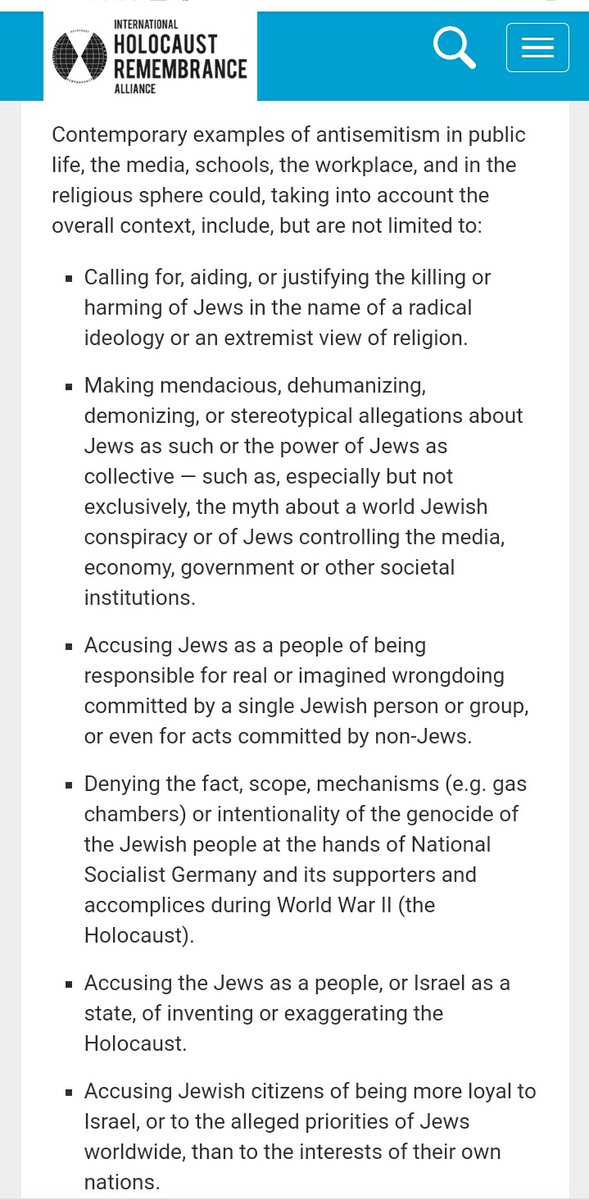
Sounds highly symbolic. If historian or writer X (whether this was Simon Schama, or David Olusoga, or David Starkey, or David Irving) did not get to speak at a Cambridge student society or at one of the other 100 universities, what would the £ losses being sought amount to?
https://twitter.com/jimwaterson/status/1392090569648885763
I am interested in whether former MP Chris Williamson could use these provisions, if a uni society which had adopted the IHRA definition of anti-semitism therefore felt unable to platform him? Does anybody know what provision there would be to exclude on grounds of anti-semitism?
Unis could lose funding if they do not adopt the IHRA definition. The government believes racist speech does not merit defence that it is legal free speech, if it breaches the IHRA definition. (Similar principle must apply to racism of other kinds too?)
https://twitter.com/GavinWilliamson/status/1314506646115278848?s=19
In certain circumstances, a hypothetically cancelled speaker might be able to pursue their hypothetically lost speaker fee in the courts!
https://twitter.com/ProfChalmers/status/1392233303286091778?s=19
Govt minister says new free speech law would *protect* holocaust denial on campus - including David Irving specifically. Govt is also asking all universities to adopt the IHRA definition of anti-semitism - this would *prohibit* holocaust denial on campus
https://twitter.com/sebschmoller/status/1392542435251789829?s=19
IHRA definition and the IHRA working examples: denying the fact, scope, mechanisms and intentionality of the genocide of the Jewish people at the hands of the Nazis. 



Trial judgement on David Irving: "he is an active holocaust denier; he is anti-semitic and racist and he associates with right-wing extremists who promote neo-nazism".
hdot.org/judge/
hdot.org/judge/

Universities face the threat of fines if they platform anti-semitic holocaust deniers, who breach the IHRA definition. And now universities *also* face the threat of intervention and fines if they refuse to platform anti-semitic holocaust deniers!
https://twitter.com/GavinWilliamson/status/1314506646115278848?s=19
The higher education minister does not know or understand the IHRA definition - or must be resiling from accepting the examples given by the IHRA, given her response to @evanhd that holocaust denial is acceptable if it "does not stray into racism"
https://twitter.com/DrMatthewSweet/status/1392515653022752779?s=19
It also shows a lack of awareness of the IHRA examples. And a lack of awareness of the David Irving case judgement, which documents ample evidence of his explicit anti-semitism and overt racism. 

To show he was not an anti-semite, Irving asked the judge to listen to an hour long speech blaming the Jews for anti-semitism and why he answered the question "did the Jews bring Auschwitz on themselves" in the affirmative. 

The government will have to choose between supporting the IHRA definition of anti-semitism as something universities must adopt & supporting David Irving's right to promote his anti-semitic views on university campuses. These are incompatible
https://twitter.com/GavinWilliamson/status/1314506646115278848?s=19
Online Harms bill will insist social media platforms show how they will remove extreme but legal content (eg: holocaust denial). Universities will have to allow it, but will face contradictory obligations when the extreme, legal speech is antisemitic
https://twitter.com/jdportes/status/1392404297921581060?s=19
The minister says the bill would protect any speech that is legal, albeit offensive. (But the Prevent duties would certainly inhibit some legal extreme speech, as would the IHRA). She says it would not protect racism (but much/most racist & antisemitic speech is not illegal) 

The Prevent Duty applying to cases of Hizb-ut-Tahrir and Anjem Choudary, and of Britain First joins the IHRA as a further unexplained contradiction in the illogical claim that all offensive but legal speech will be protected by the new bill. 

To say that all legal speech will be allowed [which seems unlikely], but also that speech that strays into racism won't be allowed appears to show a lack of understanding of the law. (Most racist speech is legal, but some racist speech is not).
https://twitter.com/sundersays/status/1314986105205329922
Audio of the Irving clip
https://twitter.com/Ian_Fraser/status/1392606359170977795?s=19
Minister is clear that anti-semitism is abhorrent & will not be tolerated on campuses (hence pressure to adopt IHRA, to restrict extreme but legal speech).This *sounds* like a u-turn on her interview saying new law would protect holocaust denial on campus
https://twitter.com/michelledonelan/status/1392587452787970048?s=19
She needs to add the IHRA definition of anti-semitism to this list of government policy exceptions to its free speech laws. Irving falls outside the IHRA (as a holocaust denier). It is not clear to me whether/why he is outside the exceptions that she cites
https://twitter.com/michelledonelan/status/1392587604714037252?s=19
A serious debate about free speech would require those on different 'sides' to look through the other end of the telescope & take issues of boundaries seriously. This debate mainly an exchange of rhetorical soundbites until people at least try to do this.
https://twitter.com/sundersays/status/1232612012246605824?s=19
Minister struggled to explain how the specific reforms deal with self-censorship claims, citing "culture shift" aim
But govt wants IHRA as culture shift (restrict anti-semitic speech) & her advocacy to allow+protect holocaust denial would undermine that
But govt wants IHRA as culture shift (restrict anti-semitic speech) & her advocacy to allow+protect holocaust denial would undermine that
https://twitter.com/CST_UK/status/1313811423554871296?s=19
Govt's aim is surely to have a chilling effect on anti-semitism. So proposing a warmer campus climate for holocaust denial should not be part of their policy. Their contradictory account of free speech + racism in uni bill & online harm bill is a real mess
https://twitter.com/michelledonelan/status/1392587731537170439?s=19
I doubt many people remember that the government also embarked on a process (2019) to produce a working definition of anti-Muslim prejudice. I am not sure they are pursuing this in practice, as they have neither publicly progressed nor abandoned it
gov.uk/government/new…
gov.uk/government/new…
• • •
Missing some Tweet in this thread? You can try to
force a refresh













